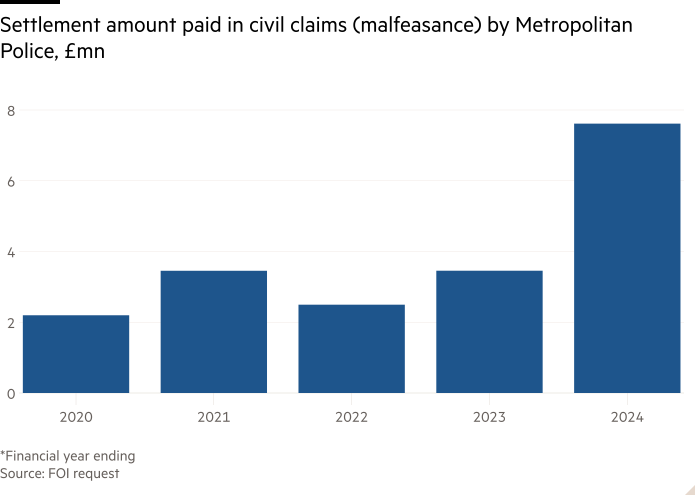
Unlock the Editor’s Digest for free
Roula Khalaf, Editor of the FT, selects her favourite stories in this weekly newsletter.
Settlement payments by London’s Metropolitan Police more than doubled in the past year to £7.6mn, as Britain’s biggest force resolved hundreds of cases involving allegations of misconduct by officers.
The Met’s settlement payments to claimants in civil cases in the 2023-24 financial year jumped from £3.5mn in 2022-23, according to data obtained by the Financial Times under UK transparency laws.
The claims, grouped under “malfeasance”, included cases where officers were alleged to have acted with excessive force, used false evidence, racially profiled individuals or breached rights under the European Convention on Human Rights.
In the year to April 2024, the Met settled 239 civil cases relating to malfeasance, up from 198 in 2022-23, according to the figures.
The Met has been under intense pressure to improve standards since an independent review in 2023 found the force was institutionally racist, misogynistic and homophobic and called for it to be broken up if it could not effect a complete overhaul.
Recent high-profile civil cases include that of Jennifer Edmunds, who sued the force for breaching her human rights and false imprisonment after she was detained at a vigil for Sarah Everard in 2021.
Earlier that year Everard was kidnapped, raped and murdered by a Met officer who is now serving a whole-life prison sentence.

Other cases include that of Dale Semper, who alleged that Met officers racially profiled him and wrongly accused him of being involved in gun crime after pulling him over in 2017.
Semper was suspended from his job as a bank manager but was later cleared of any wrongdoing, and this month he reached a settlement with the Met.
Since 2019-20, the Met has paid more than £19mn in civil claims, and total payments have risen continuously over the past three years.
Carolynn Gallwey, a partner at Bhatt Murphy Solicitors, who represented Edmunds, said the increase probably resulted from more scrutiny of officers’ behaviour following a string of well-publicised cases.
“There has been a tipping point in recent years, with many victims who previously would not have brought claims forward now feeling able to do so,” she said.
Gallwey added that increased use of footage from body cameras, which were first introduced widely by the Met in 2016, had helped encourage claimants to raise a case.
“Previously, it was one word against another, but the introduction of body camera footage has exposed a level of misconduct that went unanswered before,” she said.
A second senior lawyer at another law firm said the Met’s decision to continue litigating cases, rather than agreeing an early settlement, had also contributed to the rise in taxpayer-funded payments.
“By not settling cases early, the Met ends up paying victims more due to the added legal costs which are incurred. If anything, the force should be settling more often,” he said.
Met commissioner Sir Mark Rowley pledged to do “everything . . . humanly possible” to implement the recommendations made by Baroness Louise Casey in her review last year.
His drive to weed out sexual predators and other offenders has led to the suspension or restriction in duties of more than 1000 officers and accelerated probes into misconduct.
The Met said in a statement it had “an established process for recording and dealing with civil claims” and that all claims were “thoroughly examined and where appropriate, robustly defended”.
“By nature, policing is a dynamic and at times physical occupation which can, on occasion, lead to claims being made against our officers,” the force said. “Our officers understand this and are well aware that they are rightly accountable for the actions they take.”